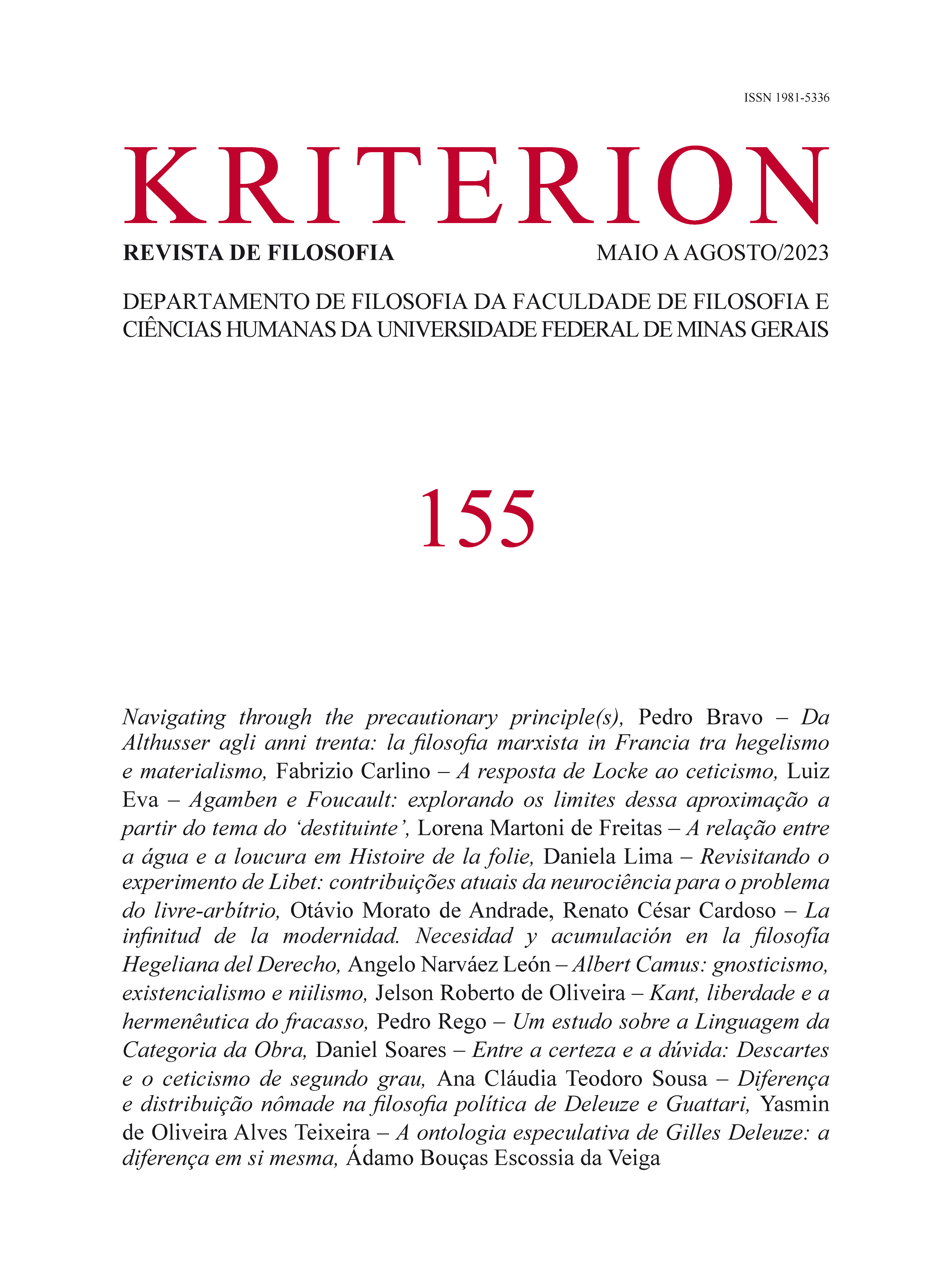A STUDY ON THE LANGUAGE OF THE WORK CATEGORY
Keywords:
Work, Language, Violence, Eric WeilAbstract
In Eric Weil’s Logic of Philosophy, the work appears as
a rupture with the absolute, an attitude of pure violence, whose opposition is realized by acting, therefore, it is mute. And yet, this attitude has a language. This paper seeks to understand how this contradiction is possible, characterizing the language that the work makes use of. To this end, we have divided this paper into three sections. In the first section, we present the distinction between language and discourse as understood by Weil. Thus arises the resource through which the loan of a discourse to violence is understood, which allows access to its language. In the second section we propose a division of the language of the work into three levels: phenomenon, formality and form. In this section we also discuss an example of the formality with the condition category. In the last section, we propose six features that constitute the third level of the language of the work: myth, metaphor, feeling, usefulness, proposition and imperative. The paper concludes with a review of the aspects worked in the light of the lie and with the proposal of an imperative that is opposed to the imperative of the work, therefore, to its language.
Downloads
References
ARENDT, H. “Eichmann em Jerusalém: um relato sobre a banalidade do mal”. Tradução José Rubens Siqueira. São Paulo: Companhia das Letras, 1999.
BERNARDO, L. M. A. V. “Linguagem e discurso: uma hipótese hermenêutica sobre a filosofia de Eric Weil”. Lisboa: Imprensa Nacional Casa da Moeda, 2003.
BIGNOTTO, N. “Bolsonaro e o bolsonarismo entre o populismo e o fascismo”. In: BIGNOTTO, N. et al. Linguagem da destruição: a democracia brasileira em crise. São Paulo: Companhia das Letras, 2022.
CAILLOIS, R. “La violence pure est-elle démoniaque?” In: Actualité d’Éric Weil. Paris: Éditions Beauchesne, 1984. pp. 213-222.
CANIVEZ, P. “Weil”. Paris: Les Belles Lettres, 1999.
______. “Le sa politique et logique dans l’oeuvre d’Eric Weil”. Paris: Eitions Kimé, 1993.
GUIBAL, F. “La philosophie et son ‘autre’: Réflexions à partir de l’oeuvre d’Éric Weil”. In: Actualité d’Éric Weil. Paris: Éditions Beauchesne, 1984, pp. 105-117.
JASPERS, K. “A questão da culpa: a Alemanha e o nazismo”. Tradução C. Dornbusch. São Paulo: Todavia, 2018.
KIRSCHER, G. “Eric Weil ou la raison de la philosophie”. Paris: Presses Universitaires du Septentrion, 1999.
______. “Figures de la violence et de la modernité: Essais sur la philosophie d’Eric Weil”. Lille: Presses Universitaires de Lille, 1992.
______. “La philosophie d’Eric Weil”. Paris: Presses Universitaires de France, 1989.
PLATÃO. “A república”. Tradução, introdução e notas E. M. Teixeira. Fortaleza: Edições UFC, 2009.
PERINE, M. “Platônicos sem mito e sem deus”. In: PERINE, M., COSTESKI, E. (eds.). Violência, educação e globalização: compreender o nosso tempo com Eric Weil. São Paulo: Edições Loyola, 2016.
______. “Filosofia e violência: sentido e intenção da filosofia de Éric Weil”. São Paulo: Edições Loyola, 1987.
QUILLIEN, J. “De la sagesse comme fin de la Logique de la Philosophie: Sens et présence, poésie et philosophie”. Annali della Scuola Normale Superiore di Pisa, Vol. XI, Nr. 3, pp. 1223-1242, 1981.
______. “Discours et langage ou ‘Logique de la philosophie’”. Archives de Philosophie, Nr. 33, pp. 401-438. Paris: Beauchesne, 1970.
RICOEUR, P. “Violência e linguagem”. In: Leituras 1: Em torno ao político. Tradução M. Perine. São Paulo: Edições Loyola, 1995.
______. “De l’Absolu à la sagesse par l’Action”. In: Actualité d’Éric Weil. Paris: Éditions Beauchesne, 1984. pp. 407-423.
SAVADOGO, M. “O sentido da oposição entre razão e violência segundo Eric Weil”. In: PERINE, M., COSTESKI, E. (eds.). Violência, educação e globalização: compreender o nosso tempo com Eric Weil. São Paulo: Edições Loyola, 2016.
______. “Éric Weil et l’achèvement de la philosophie dans l’Action”. Namur: Presses Universitaires de Namur, 2003.
STANLEY, J. “Como funciona o fascismo: a política do ‘nós’ e ‘eles’”. Tradução B. Alexander. Porto Alegre: L&PM, 2019.
TEIXEIRA, E. “Introdução e notas”. In: PLATÃO. A república. Tradução, introdução e notas E. M. Teixeira. Fortaleza: Edições UFC, 2009.
WEIL, E. “Lógica da Filosofia”. Tradução L. C. Malimpensa. São Paulo: É Realizações, 2012.
______. “Filosofia política”. Tradução M. Perine. São Paulo: Edições Loyola, 2011.
______. “La culture”. Philosophie et réalité II. Paris: Beauchesne Éditeur, 2003.
______. “Masses et individus historiques”. In: Essais et conférences: tome II. Paris: Librarie Philosophique J. Vrin, 1991.
______. “La morale de l’individu et la politique”. In: Essais et conférences tome I. Paris: Librairie Plon, 1970.
Downloads
Published
How to Cite
Issue
Section
License
Copyright (c) 2023 Revista Kriterion

This work is licensed under a Creative Commons Attribution 4.0 International License.










